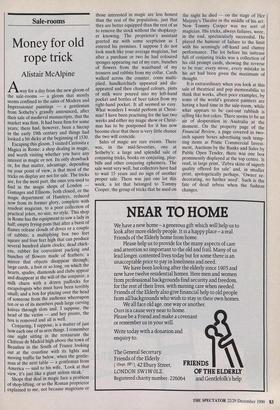Sale-rooms
Money for old rope trick
Alistair McAlpine
Away for a day from the new gloom of the sale-rooms — a gloom that mostly seems confined to the sales of Modern and Impressionist paintings — a gentleman from Sotheby's grandly announced, after their sale of medieval manuscripts, that the market was firm. It had been firm for some years; there had, however, been a hiccup in the early 19th century and things had looked a bit dicky at the beginning of 1530. Escaping this gloom, I visited Curiosita e Magica in Rome: a shop dealing in magic, and worth visiting whether you have any interest in magic or not. Its only drawback or, for that matter, advantage, depending on your point of view, is that most of the tricks on display are not for sale. The tricks are, for the most part, the ones you used to find in the magic shops of London — Gamages and Ellisons, both closed, or the magic department of Hamleys, reduced now from its former glory, complete with resident magician, to a poor collection of practical jokes, no size, no style. This shop in Rome has the equipment to saw a lady in half; empty frying-pans that after a burst of flames release clouds of doves or a couple of rabbits; a multiplying box two feet square and four feet high that can produce several hundred alarm clocks; dead chick- ens, rubber for convenient packing and bunches of flowers made of feathers; a mirror that objects disappear through; large cards, a foot or so long, on which the hearts, spades, diamonds and clubs appear and disappear at the will of the conjuror; a milk churn with a dozen padlocks for escapologists who must have been terribly small; and a box for placing over the head of someone from the audience whereupon ten or so of its members push large carving knives through slots and, I suppose, the head of the victim — and hey presto, the box is removed and all is well. Conjuring, I suppose, is a matter of just how each one of us sees things. I remember one night sitting in the restaurant the Château de Madrid high above the town of Beaulieu in the South of France looking out at the coastline with its lights and moving traffic far below, when the gentle- man at the next table — a gentleman from America — said to his wife, 'Look at that view, it's just like a giant sirloin steak.' Shops that deal in magic face a problem of shop-lifting, or so the Roman proprietor explained to me, not because magicians or those interested in magic are less honest than the rest of the population, just that they are better equipped than the rest of us to remove the stock without the shopkeep- er knowing. The proprietor's assistant greeted me with some scepticism as I entered his premises. I suppose I do not look much like your average magician, but after a purchase or two he had coloured sponges appearing out of my ears, bunches of flowers from the waistband of my trousers and rabbits from my collar. Cards walked across the counter, coins multi- plied, handkerchiefs appeared and dis- appeared and then changed colours, pints of milk were poured into my left-hand pocket and bottles of beer taken from my right-hand pocket. It all seemed so easy. What wonders I would perform at Christ- mas! I have been practising for the last two weeks and either my magic show or Christ- mas has to be postponed for it has now become clear that there is very little chance the two will coincide.
Sales of magic are rare events. There was, in the mid-Seventies, one at Sotheby's: a large and splendid sale of conjuring tricks, books on conjuring, play- bills and other conjuring ephemera. The sale went very well, but collectors have had to wait 15 years and no sign of another proper sale. There was just one lot this week, a lot that belonged to Tommy Cooper, the group of tricks that he used on the night he died — on the stage of Her Majesty's Theatre in the middle of his act. Now Tommy Cooper was my sort of magician. His tricks, always failures, were, in the end, spectacularly successful. He played the humour of failure to the limit with his seemingly off-hand and clumsy performance. The lot before his suitcase full of conjuring tricks was a collection of his old prompt cards, showing the reverse to be true: every move, every mistake in his act had been given the maximum of thought.
It is extraordinary when you look at this sale of theatrical and pop memorabilia to think that works, albeit poor examples, by some of the world's greatest painters are having a hard time in the sale-room, while what appears to be cast-out rubbish is selling like hot cakes. There seems to be an air of desperation in Australia at the moment. On the property page of the Financial Review, a page covered in two- inch square boxes advertising such temp- ting items as Prime Commercial Invest- ment, Auctions by the Banks and Sales by Public Open Tender, there was one box prominently displayed at the top centre. It read, in large print, 'Zebra skins of superb quality offered for sale' and, in smaller print, apologetically perhaps, 'Owner re- decorating, no further need'. Such is the 'fate of dead zebras when the fashion changes.


































































































 Previous page
Previous page